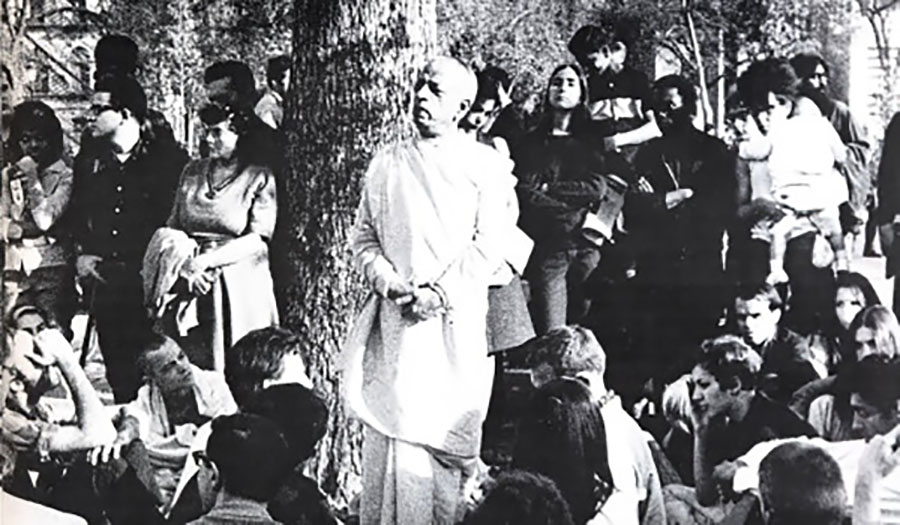ISKCON 50 Meditations: November 9, 2016
By Satsvarupa dasa Goswami | Nov 09, 2016

The Mind of the Acarya
Vaisnavera kriya mudra vijne na bujhaya: “One cannot understand the mind or the activities of the Vaisnava.” This means that a pure devotee should never be judged by material standards, and when we associate with him, we shouldn’t take him for granted. Don’t think he is an ordinary person. The depth of his love for Krishna is a mystery to us.
On the other hand, I always assumed that there was a normal, intelligent exchange going on between Srila Prabhupada and me. A disciple may exaggerate that because Prabhupada is mystical and dear to Krishna, therefore at every moment, some strange vibration is coming from him and he’s signalling to us in unknown ways. Prabhupada, however, always emphasized normal exchanges of intelligence. He mocked the “fable” of a guru who transferred knowledge to his disciple by electric shock and then said he’d lost all of his own knowledge. Srila Prabhupada always talked about Krishna in an authorized way, and with realization. He spoke of pure devotees and devotional service. But he didn’t talk about himself as someone special or more advanced. Neither did he tell us exactly what he was thinking in his inner mind, although sometimes when disciples were talking among themselves, they would speculate about the mind of the acarya. When we were with Srila Prabhupada, he was always present in a real and personal way. He was our friend and teacher, a nectarean pure devotee of the Lord.
In reverence, we accepted the fact that Srila Prabhupada’s devotion to Krishna was beyond us. And we were also happy that Srila Prabhupada was with us, as our venerable and lovable spiritual master. But there were other aspects of his personality which were dear to us, although they didn’t quite fit in with standard conceptions we may have had of a “pure devotee” or a “spiritual master.” One example is Prabhupada’s childlike nature.
One time I accompanied Srila Prabhupada and Rayarama on a visit to the lawyer to see about Swamiji’s immigration status. We were in the waiting room discussing the legal case, when Swamiji became absorbed in playing with a lamp that was in the office. This lamp was in the shape of a ship’s stern, and it had a small propeller. While we were speaking of immigration legalities, Swamiji reached over and began spinning the propeller on the boat. It was as if he reserved the right, at any time, to drop out of the reality which others were taking so seriously. It reminded you of liberated souls you’d read about, like the Kumaras. And it indicated that we don’t know the mind of the acarya.
Another time Swamiji and several devotees were on a tour of a building in Manhattan, with the idea to purchase it. The real estate agent led Swamiji through the rooms, explaining everything. But at one point we noticed that Swamiji wasn’t with us. He had been left behind somewhere, and when we found him he was in a remote part of a room playing with the foot pedal of an old-fashioned sewing machine. He was standing by himself and operating it with his foot, exempting himself for the time being, from the heavy real estate talks.
I’ve also seen Prabhupada sit in the back seat of a car and crank the window up and down repeatedly, and I have seen him move his finger across a fogged window pane and make playful marks. In a detached way, Prabhupada liked to hum and sing to himself. Whatever Prabhupada did, it was an answer to the question made by Arjuna in the Bhagavad-gita, “How does a transcendentalist walk, how does he sit, and how does he speak?” Sometimes the paramahamsas or swanlike persons float on the water of the material world and appear to be like children. Sometimes they act like madmen and don’t communicate at all, although Srila Prabhupada never did that. And most often, they are teachers with their finger raised in the jnana-mudra pose, instructing the conditioned souls.















